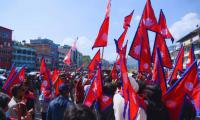What India’s NSG application does not say?
India has greatly politicised the Nuclear Suppliers Group (NSG) in past few months. Modi's proactive diplomacy is instrumental in creating this controversial situation and the media is abuzz since there was a stalemate over India's bid during Group's annual meeting in June at Seoul. A month earlier, India and Pakistan had applied for NSG's membership. Being party to the Non-Proliferation Treaty is the key factor in membership criteria, NSG did not take a decision and has shelved the matter for future deliberations. NSG was created in 1975 as a consequence of Indian proliferation and therefore reinforces NPT in preventing proliferation of nuclear weapons.
NSG can overcome its predicament by maintaining neutrality as a group in dealing with the non-NPT states on the basis of a uniform criteria that does not appear discriminatory to the applicants. NSG took a major misstep in 2008 by granting an exceptional waiver to India under American influence and short-term economic and geopolitical interests. This trade waiver has allowed New Delhi to vertically proliferate and destabilise the region. India's NSG application tactfully overlooks this and several other aspects explicated below.
'Denial' of NSG membership was a rude shock to India. Modi and his administration has earned the wrath of opposition parties for misleading the nation, while the media has put the entire blame on one country for blocking India's case, expediently ignoring other significant voices of dissent within the NSG.
In effort to pacify the criticism and to 'reassure' the public that India had a case, its 300-page formal application was leaked to the media. The 41-page summarised substance presents the net-gain: "India's participation in the NSG would strengthen international efforts to prevent the proliferation of nuclear weapons." This claim should be taken with a pinch of salt.
The reasons for NSG to carry forward the "logic" of 2008 exemption from its trade restrictions holds little water. In fact, it should be reversed because India has done little for proliferation and has in fact vertically proliferated in building its fissile material stocks. In signing over a dozen trade deals, Indian indigenous uranium was ostensibly freed to be diverted for making more bombs for the triad, the huge missile inventories and for developing miniaturised warheads. India has gone beyond implementing "strict" non-proliferation obligations it undertook to gain NSG exemption.
The application presents an incomplete, and somewhat misleading, picture of one-sided narrative. Firstly, it is well established that India's 2008 NSG exemption was driven by the logic of geopolitics and trade gains. The US sacrificed its non-proliferation principles over its pursuit of building India as a counter-weight to China. France and Russia negotiated nuclear cooperation with India, even a year before NSG exemption was finalised. Contrary to what is described as a "conscious decision" in India's application, the NSG exemption was actually a result of political arm-twisting of opposing states that went on until 2 am on 6 September 2008, when the 'consensus' was finally evolved!
Secondly, contrary to the misperception created in the application, India did not commit to any 'strict' non-proliferation obligations to gain NSG exemption such as signing the Comprehensive Test Ban Treaty (CTBT) or ending fissile material production, like other recognised nuclear weapon states of NPT. It seems highly unlikely that India would accept such conditions, if put as criteria for membership, as it builds largest enrichment complex at Karnataka that could potentially be used for mega-ton yield thermo-nuclear weapons. The country possesses largest unsafeguarded nuclear enterprise in the world.
The safeguards agreement negotiated with the International Atomic Energy Agency (IAEA) contains several loopholes that could allow India, at its will, to divert foreign nuclear material provided for peaceful purposes to significantly augment its military nuclear arsenal. India's Additional Protocol is deemed a "mickey mouse" instrument with little substantive undertaking.
Thirdly, India's objectives to join NSG are anything but to strengthen the non-proliferation regime. India has long pursued the 'nuclear route' to become a global power, as best described in former Indian Prime Minister I K Gujral's 1997 statement, that "when my third eye looks at the door of the Security Council chamber it sees a little sign that says 'only those with economic power or nuclear weapons allowed." The country thus views NSG membership as a stepping stone to assume greater influence in global politics. This linkage is more manifest than ever in recent India-US Joint Statement of June 2106.
Fourthly, India's membership carries the potential of changing the very character or identity of NSG, as India assumes equal stake in the rule-making process. Rather than restricting the proliferation of nuclear weapon enabling technologies, India may well be aiming to liberalise them. For example, NSG and India hold competing views on transfers related to sensitive nuclear technologies such as Enrichment and Reprocessing (ENR).
India claims it won 'clean exemption' in 2008, with full access to such technologies, and wants to join NSG with the same understanding. Whereas, ENR transfers are not permissible to non-NPT states, such as India, as per 2011 revision of NSG guidelines. Should the NSG consider it a mere coincidence that India applied for NSG membership on 12 May - the intervening day of its 1998 nuclear testing anniversary - or a calibrated message that it is not how NSG decides but how India decides under what terms it would become NSG member?
Finally, it is an indisputable historical fact that the NSG was created in direct response to India's state-sanctioned proliferation act. India diverted nuclear material from its peaceful programme to conduct first nuclear test in 1974. As India boasts its self-professed "unblemished" non-proliferation record, it might also wish NSG to correct this 'historical anomaly.'
Instead of impeding the path of the 'proliferator of South Asia', the members of MTCR swiftly absorbed it into the regime because they knew that a stalemate in NSG could reduce India's prospects in MTCR! These cartels seem more about politics and monopoly than pure non-proliferation ideals. Now monopolisers would suggest that since a proliferator can be allowed into MTCR, it has a case for NSG despite it mocking at NPT signatory states for having the bomb and still getting the trade and perks New Delhi does not deserve!
The 2008 India-exemption tainted the credibility of NSG, as an effective non-proliferation institution. With membership applications of India (and Pakistan) at its table, NSG has the golden opportunity to restore its credentials, by demanding stringent non-proliferation criteria for admission, rather than succumbing yet again under political pressure of few major powers. The writer is currently the Visiting Fellow (South Asian Strategic Affairs) at the International Institute of Strategic Studies, London.
-
 Nepal To Vote In First Election Since Gen Z-led Protests Ousted Government
Nepal To Vote In First Election Since Gen Z-led Protests Ousted Government -
 Megan Fox Breaks Social Media Silence: 'I'm Alive'
Megan Fox Breaks Social Media Silence: 'I'm Alive' -
 Prince William Relying On TWO Royals For ‘valuable Support’
Prince William Relying On TWO Royals For ‘valuable Support’ -
 Demi Lovato Gets Honest About Her 'bratty' Behavior During Disney Days
Demi Lovato Gets Honest About Her 'bratty' Behavior During Disney Days -
 Megan Fox Makes Blunt Admission About Never Loving Her Body?
Megan Fox Makes Blunt Admission About Never Loving Her Body? -
 Princess Diana Relished THIS British ‘comfort Food’, Reveals Expert
Princess Diana Relished THIS British ‘comfort Food’, Reveals Expert -
 Ryan Gosling Reveals Secret Role Played By His Daughters In 'Project Hail Mary'
Ryan Gosling Reveals Secret Role Played By His Daughters In 'Project Hail Mary' -
 Kate Middleton ‘powerful Style Statement’ Keeps Away From ‘distractions’
Kate Middleton ‘powerful Style Statement’ Keeps Away From ‘distractions’ -
 Madeline Ross, Sister Of Popular Streamer Adin Ross, Dies At 36
Madeline Ross, Sister Of Popular Streamer Adin Ross, Dies At 36 -
 Christina Applegate Confesses She Realized Ex Johnathon Schaech 'was Not The Man' On Wedding Day
Christina Applegate Confesses She Realized Ex Johnathon Schaech 'was Not The Man' On Wedding Day -
 Princess Diana Disliked ‘silly’ Day Celebrated By Youth
Princess Diana Disliked ‘silly’ Day Celebrated By Youth -
 Nicole Kidman Says ‘I Can Remove All The Organs’ Ahead Of New Role
Nicole Kidman Says ‘I Can Remove All The Organs’ Ahead Of New Role -
 US Banks On High Alert For Cyberattacks As Political Tension Escalates
US Banks On High Alert For Cyberattacks As Political Tension Escalates -
 Rebecca Gayheart Marks Daughter Special Day 12 Days After Eric Dane's Death
Rebecca Gayheart Marks Daughter Special Day 12 Days After Eric Dane's Death -
 Sarah Ferguson Only Held Daughters For The Sake Of ‘cameras’
Sarah Ferguson Only Held Daughters For The Sake Of ‘cameras’ -
 Rachel Reeves Predicts UK Economy Will Outperform Forecasts, But Experts Remain Cautious
Rachel Reeves Predicts UK Economy Will Outperform Forecasts, But Experts Remain Cautious



